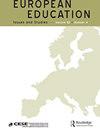不可能的鉴定?荷兰作为智利教育决策辩论中的“参考社会”(2014-2015)
IF 0.3
Q4 EDUCATION & EDUCATIONAL RESEARCH
引用次数: 2
摘要
摘要本文通过考察荷兰作为一个新的“参考社会”的建设,调查了智利的政策制定辩论。它侧重于旨在转变新自由主义学校治理模式的改革议程。基于对政府文件、议会辩论和媒体材料的分析,本文得出结论,除了考虑PISA结果外,与荷兰的认同从根本上说是一种政治妥协解决方案。本文章由计算机程序翻译,如有差异,请以英文原文为准。
An Improbable Identification? The Netherlands as a “Reference Society” within the Chilean Educational Policy-Making Debate (2014–2015)
Abstract This paper investigated a policy-making debate in Chile, by examining the construction of the Netherlands as a new “reference society”. It focused on a reform agenda that aimed at a transformation of the neo-liberal school governance model. Based on the analysis of government documents, parliamentary debates, and media materials, the paper concludes that in addition to the consideration of PISA results the identification with the Netherlands served fundamentally as a political compromise solution.
求助全文
通过发布文献求助,成功后即可免费获取论文全文。
去求助
来源期刊

European Education
EDUCATION & EDUCATIONAL RESEARCH-
CiteScore
1.20
自引率
0.00%
发文量
5
期刊介绍:
uropean Education is published in association with the Comparative Education Society in Europe (CESE). It is an international peer-reviewed journal devoted to original inquiries and dialogue on education across the member states of the Council of Europe. Established in 1969, the journal features articles on education in individual member states, comparative studies on education across Europe, as well as the impact of European education initiatives globally. The journal especially encourages theoretical and empirical studies, interdisciplinary perspectives, and critical examination of the impact of political, economic, and social forces on education. European Education includes reviews of books and educational films, including those published/produced in English and other languages.
 求助内容:
求助内容: 应助结果提醒方式:
应助结果提醒方式:


